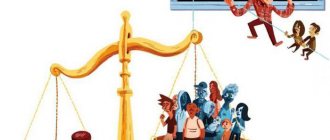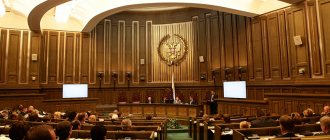Interrogation of the defendant and reading of his testimony at the court hearing
Groups Prosecutor's Office of the City of Cherepovets Prosecutor explains
December 13, 2021 at 08:05
Author: Prosecutor's Office of the city of Cherepovets
Log in to the site and you can join the group.
The procedure for interrogating the defendant and reading out his testimony during the trial is regulated by Art. 275 and 276 of the Code of Criminal Procedure of the Russian Federation.
The defendant is not required to testify in court - it is his right.
An essential element in the implementation of the defendant’s right to defense is the possibility of him giving evidence with the permission of the presiding officer at any time during the judicial investigation. If several defendants are involved in the consideration of a criminal case, the order in which they present evidence is determined by the court, taking into account the opinions of the parties.
The interrogation of the defendant in a court hearing differs from his interrogation during the preliminary investigation; this is due both to its procedural position and to the peculiarities of the judicial investigation in an adversarial process, where the defendant acts as an equal party, participates in the examination of all evidence presented to the court, including interrogations of persons summoned to the court hearing.
If the defendant agrees to testify, he is questioned first by the defense attorney and trial participants on the defense side, then the state prosecutor and trial participants on the prosecution side.
The presiding officer has the responsibility to reject leading questions and questions that are not related to the criminal case. An issue that is not related to a criminal case should be understood as one that goes beyond the scope of the trial (Article 252 of the Code of Criminal Procedure of the Russian Federation). The court has the right to ask questions to the interrogated person only after the parties have completed his interrogation. At the same time, according to Part 3 of Art. 275 of the Code of Criminal Procedure of the Russian Federation, the court does not interrogate, but only asks questions to the defendant. This means that the court does not have the right to take on the task of exposing or, conversely, acquitting the defendant. The defendant has the right to use written notes and not give an explanation as to their origin, but is obliged to present them to the court upon his request.
In accordance with Part 1 of Art. 276 of the Code of Criminal Procedure of the Russian Federation, the court has the right to decide to read out the defendant’s testimony given during the preliminary investigation. It is also permitted to reproduce photographic materials, audio and video recordings, filming of his testimony or other investigative actions attached to the interrogation protocol.
This right is granted in the event of a petition from either party on three grounds:
- if there are significant contradictions between the testimony given by the accused during the preliminary investigation and the testimony of the defendant, which he gives during his interrogation in court proceedings, except in cases of inadmissibility of evidence (Article 75 of the Code of Criminal Procedure of the Russian Federation);
- when considering a criminal case in the absence of the defendant, when in a criminal case for a crime of minor or medium gravity, the defendant petitions for resolution of this case in his absence and the court agrees with this;
- if the defendant refuses to testify, if the requirements of paragraph 3 of Part 4 of Art. 47 Code of Criminal Procedure of the Russian Federation.
It is prohibited to disclose the testimony of a suspect or accused given during pre-trial proceedings in the case in the absence of a defense attorney, including cases of refusal of a defense attorney if the defendant does not confirm them in court (Clause 1, Part 2, Article 75 of the Code of Criminal Procedure of the Russian Federation), although this arises significant contradiction in his testimony.
0
0
Copy link
Author of the publication
offline 8 hours
Prosecutor's office of the city of Cherepovets
17
162600, Cherepovets, Lunacharsky Ave., 11a contact phone: (8-8-202) 50-15-38 fax: 50-15-58 e-mail
Comments: 0 Publications: 976 Registration: 07/31/2019
Does the court have the right to reject defense counsel's questions?
Defense attorneys in court are often faced with a situation where their carefully prepared questions for cross-examination of a prosecution witness are rejected by the judge - for example, on grounds such as “this is not relevant”, “formulate more clearly”, “there is no need to ask hypothetical questions”, “ ask about circumstances relevant to the case”, “leading question”.
Of course, ideally it is better to avoid questionably worded questions. But I would like to focus on something else. Suppose a lawyer needs to ask a witness certain questions. How far does he have the right to go? There may also be situations when the issues relevant to the case are specific, but their connection with the circumstances to be proven is not obvious. In such cases, the court, as a rule, begins to actively intervene in cross-examination.
Like many colleagues, I have encountered similar circumstances more than once. Building a clear pattern of questions, where the answer to the first leads to the second (the so-called “Socratic method”), ultimately helps to achieve results. But if the judge, rejecting questions, begins to actively interfere, the scheme often collapses, and the defense attorney may be left with nothing.
What can be done in such a situation? Let's think about it.
In my opinion, there are three approaches to solving this problem (two obvious and one non-obvious). The first is the correct formulation of the question (which is most often suggested by lawyers and law enforcers).
However, in the absence of a clear theoretical basis for the “correct formulation of the question”, and also when for the judge the “correct formulation” is not the same as the defense lawyer sees it, one can try to “justify this particular formulation” - i.e. motivate your question. The third option (the one that appeals to me the most) is to justify your right to “ask any questions.”
The first approach, in my opinion, is perfectly explained by E.A. Rubinstein in the preface to F. Wellman’s book “The Art of Cross-Examination”1. The second is also most often used by practitioners who are trying to quickly navigate the situation and not allow the judge to confuse themselves. In particular, they try to either link their question with the circumstances to be proven, or quote Part 2 of Art. 79 of the Code of Criminal Procedure of the Russian Federation “A witness may be questioned about any circumstances related to the criminal case, including the identity of the accused, the victim and his relationship with them and other witnesses.”
As for the third approach - to justify your right to ask “any” questions - I note that some of the questions, even if the lawyer is allowed to ask them, will still not have much value, since the answers to them, as a rule, are either based on assumptions, or are not relevant. At the same time, each situation is individual, and given how few acquittals are made in the country as a whole, it is not superfluous to have at your disposal the entire arsenal of possibilities for the full implementation of the defense.
In this regard, I believe that the defense attorney has the right to ask almost any question (of course, without going beyond the scope of the CPEA) during the cross-examination of the witness. This, in my opinion, is not only logical, but also consistent with both the Code of Criminal Procedure of the Russian Federation and the essence of cross-examination.
This position can be supported by the following arguments.
Norm clause 11, part 1, art. 53 of the Code of Criminal Procedure of the Russian Federation allows for the implementation of defense “to use other means and methods not prohibited by this Code...”. I think this is a very important point. The law allows the defender to take a creative approach to the performance of his function, to use any methods, as long as they are not directly prohibited by the Code. Questions in this case are a way to protect.
What questions does the Code of Criminal Procedure of the Russian Federation directly prohibit asking and to whom?
As for the conduct of investigative actions, Part 2 of Art. 189 of the Code states: “It is prohibited to ask leading questions. Otherwise, the investigator is free to choose interrogation tactics.” That is, at the stage of investigation, the Code of Criminal Procedure of the Russian Federation allows the investigator to ask any questions, except leading ones. At the same time, I cannot but agree with the opinion of many legal scholars (for example: E.A. Rubinshtein in the commentary to Article 189 of the Code of Criminal Procedure of the Russian Federation)2 that the prohibition of asking leading questions in this norm applies only to the investigator, but not to the defense attorney.
The Code does not define the concept of leading questions. However, in theory, as well as in accordance with judicial practice, questions with a hint or those that mention facts that were not previously included in the testimony are considered leading. At the same time, as E. Rubinstein noted: “... the Supreme Court of the Russian Federation does not have a unified systemic understanding of the “leading question””3.
Thus, the defense attorney at the investigation has no restrictions at all in posing questions. But maybe they still appear at the stage of judicial investigation?
In Art. 275 of the Code of Criminal Procedure of the Russian Federation “Interrogation of the defendant” states: “The presiding officer rejects leading questions and questions that are not related to the criminal case.” That is, the presiding officer has the right to reject, in addition to leading questions, questions that are not relevant to the case. At the same time, Art. 278 of the Code of Criminal Procedure of the Russian Federation “Interrogation of Witnesses” does not contain any indication of the right of the presiding officer to reject any questions.
I believe this is logical, because the right to reject leading questions when interrogating a defendant is determined by the legislator’s intention to protect the latter, to give him more rights and to prevent arbitrariness against him. It is precisely this function that the court should a priori perform.
That is, as soon as the presiding judge begins to reject defense questions to the witness, the defense attorney can ask the court for permission to continue asking them exactly in the wording in which he wants to ask, citing the fact that, based on the meaning of Art. 53 of the Code of Criminal Procedure of the Russian Federation, a lawyer is entitled to carry out defense by any methods and means not prohibited by the Code, and raising the issue as amended is a non-prohibited method of defense.
Next, I recommend continuing to ask questions of the witness in the wording that the defense needs. If the judge begins to reject them again, I propose to file objections to the actions of the presiding officer and enter them into the protocol in accordance with Part 3 of Art. 243 of the Code of Criminal Procedure of the Russian Federation, citing the fact that, in contrast to the procedure for interrogating a defendant (Article 275 of the Code of Criminal Procedure of the Russian Federation), which presupposes the right of the presiding officer to reject leading and irrelevant questions, the procedure for questioning a witness in a court hearing (Article 278 of the Code of Criminal Procedure of the Russian Federation) does not provide the existence of such a right for the presiding officer when questioning witnesses. Accordingly, by rejecting (any) questions from the defense attorney, the presiding judge went beyond his authority. Or you can, for example, submit repeated applications, re-motivate them, etc. – each situation has its own nuances.
To support this conclusion, I would like to draw attention to Part 1 of Art. 243 of the Code of Criminal Procedure: “The presiding judge presides over the court hearing, takes all measures provided for by this Code (emphasis added – B.D.) to ensure competitiveness and equality of the parties.” That is, the measures taken by the judge must be directly provided for by the Code of Criminal Procedure of the Russian Federation. Everything that is not allowed to him is prohibited.
Thus, the presiding officer does not have the authority to reject even leading questions - at least when they are asked by the defense lawyer. And this, I think, is logical. The essence of cross-examination is to critically examine the witness's testimony given during direct examination.
For example, in practice, I often encountered situations where the state prosecutor tried to “prompt” an answer to a prosecution witness with his questions during direct interrogation. In this case, the prohibition of leading questions during direct interrogation seems quite understandable and appropriate. Although it is also not provided for the defense lawyer, if it existed, it would make sense, since the ability of a lawyer to suggest the correct answers to a defense witness during direct interrogation contradicts the essence of justice and the principle of equality and adversarialism of the parties.
But what is the point of a court arrogating to itself powers not granted to it by the Code of Criminal Procedure of the Russian Federation and applying a broad interpretation of Art. 278 of the Code in that aspect that, in principle, contradicts the ideology of cross-examination? If the goal of the defense attorney is to critically analyze the testimony of the opposing witness, to identify weaknesses and contradictions in his testimony, and often lies, within the framework of the adversarial process, the lawyer should be given maximum opportunities. How does a defense attorney who is “not allowed to do anything,” constantly interrupted by the judge with remarks like “leading question,” “that’s not relevant,” “reformulate your question,” have to creatively approach such a difficult task as cross-examination, if the witness, to for example, a skilled liar?
In conclusion, I note that the restriction that the court imposes on the defense in formulating questions contradicts, firstly, the Code of Criminal Procedure of the Russian Federation (in a systematic analysis), and secondly, the very spirit of the concept of “cross-examination”.
And even though today the courts, broadly interpreting the norms of the Code, often allow themselves to reject defense issues, our task is to defend our right to creative defense, in which “everything that is not prohibited is permitted.”
1 Francis Lewis Wellman. The art of cross-examination. – M.: American Bar Association, 2011. P. 4–31.
2 “Criminal Procedure Code of the Russian Federation. Chapters 1–32.1. Article-by-article scientific and practical commentary” (ed. by L.A. Voskobitova). (Editorial staff of RG, 2015).
3 Francis Lewis Wellman. Right there.
Rules for preparing a witness for questioning in court in a criminal case
You are summoned to court as a witness in a criminal case - advice from a criminal lawyer.
I provide a specific 20-point checklist for preparing witnesses in an American jury trial, which can be useful for the most part in our country.
- Your appearance is almost as important as what you say. When going to court, dress neatly and conservatively.
- When you take an oath, you must stand up straight and say, “I swear.” Remember that when answering questions, you should sit up straight and not slouch or lean on a counter.
- Don't put anything in your mouth, such as gum, candy, or a match.
- Speak loudly so that no one needs to ask again. Don't cover your mouth with your hand.
- Testify with confidence so that the jury will have more confidence in what you say.
- Don't memorize what you're going to say.
- Be serious. Avoid laughing or talking about the case in hallways, break rooms, or any other areas of the courthouse. Remember that jurors may see you when they enter the courthouse.
- When answering questions, address the jury. Try to look their way as much as possible and speak to them openly and sincerely, as if you were talking to a friend or neighbor.
- Listen carefully to the questions asked of you. Answer the question asked without voluntarily revealing any additional information. You have the right to explain your answer if necessary. You do not have to always answer “yes” or “no” if clarification is needed.
- If your answer was incorrect, correct yourself immediately, and if your answer was not clear, clarify it immediately as well.
- Stick to the facts, not rumors, opinions or inferences. You generally do not have the right to testify about what someone said to you or what you heard.
- If you don't understand a question, say so and ask to repeat it.
- Don't lose your temper when the prosecutor questions you.
- Be courteous to all parties and to the judge.
- If the prosecutor asks you if you've talked to anyone about this case - it's a trap question - just say yes, you've talked to a lawyer (or the police, etc.). Don't let the prosecutor increase the pace of the interrogation. Think about the answers as long as necessary, and only then answer.
- If I protest an issue, do not answer it until the judge rules on the protest. If the judge upholds the protest, that means you don't have to answer. If the judge rejects the protest, this means that the question must be answered. If you have forgotten the question by this time, you can ask him to repeat it.
- If you don't know the answer to a question, don't be nervous. Just say, "I don't know."
- If you don't want to answer a question, don't ask the judge if you have to. If the question is incorrect, I will protest and discuss it with the judge.
- When answering a question, do not look at me or the judge as if asking for help.
- When leaving the witness stand after testifying, act confident rather than depressed.
Russia has its own peculiarities and difficulties, which a high-quality lawyer will tell you about. For questioning in court as a witness, you can appear with criminal lawyer Alexander Vladimirovich Leontyev, who will monitor the legality of the investigative action being carried out, compliance with your rights, and will be able to protest in case of unlawful pressure or asking incorrect questions. Contact tel.
The Constitutional Court clarified in what cases interrogation of a lawyer is possible
The Constitutional Court of the Russian Federation issued its second ruling in recent months on a complaint about the illegal interrogation of a lawyer, confirming its position previously expressed on a similar statement (see on Legal.Report here).
The lawyer and his client complained to the Constitutional Court about the unconstitutionality of a number of articles of the Code of Criminal Procedure of the Russian Federation and the law on the Investigative Committee. In their opinion, these norms allow, without a preliminary court decision, operational search and investigative actions to be carried out against a lawyer, including monitoring the lawyer, detaining him, bringing him in for questioning as a witness, as was the case in the applicants’ case, interrogating him in in this capacity and apply other similar measures to him. By its ruling dated April 11, the Constitutional Court indicated that the contested norms do not violate the constitutional rights of the applicants, since they do not imply bringing a lawyer to the investigator for questioning as a witness about the circumstances that became known to him in connection with the provision of legal assistance, without a preliminary court decision.
A week later, on April 17, the Constitutional Court received an additional complaint from the same applicants about the violation of their constitutional rights by the provisions of the same articles of the Code of Criminal Procedure and the law on the Investigative Committee. As noted in the statement, these rules allow calling a lawyer to conduct investigative actions with him as a witness without a preliminary court decision. In addition, the applicants believe that when considering the possibility of questioning a lawyer as a witness, the court must establish whether there is consent to the specified investigative action of the person to whom the lawyer provided, is providing or will provide legal assistance.
The Constitutional Court, referring to the first ruling in the applicants’ case, reminded the authors of the complaint of the procedural regime, within the framework of which it is possible to carry out investigative actions and operational investigative measures against a lawyer. Thus, the law on advocacy establishes that a lawyer cannot be summoned and questioned as a witness about circumstances that became known to him in connection with an application to him for legal assistance or in connection with its provision. Corresponding norms are established in Part 3 of Art. 56 Code of Criminal Procedure of the Russian Federation.
However, such guarantees apply only to those relations between suspects and accused persons with their lawyers that do not go beyond the scope of providing professional legal assistance in the manner prescribed by law. That is, they are not associated with violations of a criminally unlawful nature either on the part of the lawyer, or on the part of his client, or on the part of a third party.
If, taking into account the above provisions, interrogation of a lawyer as a witness is possible, in accordance with paragraph 3 of Art. 8 of the Law on Advocacy, investigative actions are allowed only on the basis of a court decision.
The provisions of the contested norms of the Code of Criminal Procedure and the law on the Investigative Committee do not exclude the need for law enforcement officials to carry out the entire range of measures to protect the rights and legitimate interests of individuals and organizations provided for by the criminal procedure law.
As for the arguments of the additional complaint about the need for the court to clarify the question of whether such an investigative action as interrogation of a lawyer has the consent of the principal, the Constitutional Court stated the following. By virtue of the provisions of Part 3 of Art. 56 of the Code of Criminal Procedure of the Russian Federation, interrogation of a lawyer about the circumstances that became known to him in connection with the provision of legal assistance is possible only in some cases - in particular, if the lawyer applies for interrogation as a witness with the consent and in the interests of the suspect, accused, or if interrogation as a The witness is interceded by a lawyer with the consent of the person to whom he provided legal assistance.
As follows from the case materials, the lawyer did not apply for his interrogation as a witness in the client’s criminal case, and therefore the consent of the accused and other persons to whom he provided legal assistance to such interrogation was not ascertained. At the same time, the Constitutional Court noted that the applicants in their additional complaint actually propose to make reasonable, from their point of view, changes to the criminal procedural legislation, which is not within the competence of the Constitutional Court.
In this regard, the Constitutional Court stated that the additional complaint does not meet the criterion of admissibility of appeals to the court, and therefore cannot be accepted for consideration.
Commentary on Article 275 of the Code of Criminal Procedure of the Russian Federation
1. The defendant is the main participant in legal proceedings on the part of the defense. Since, as a general rule, the party presenting the evidence must ask the first questions, the defendant is questioned first by the defense attorney. The interrogation conducted by the party who presented the person to testify is called the main one in the theory of the process. The defendant is then questioned by the state prosecutor and the prosecution's participants in the trial. The interrogation following the main one and carried out by the opposite party is called cross-examination. Cross-examination is not limited to the circumstances that were examined during the main examination. The Code of Criminal Procedure does not contain a prohibition, characteristic, for example, of English criminal proceedings, that during the cross-examination of the defendant, unlike witnesses, he cannot be asked the so-called. defamatory questions, i.e. questions intended to show that the person's testimony cannot be trusted. The parties are not limited in the number of questions they ask or in the duration of the interrogation. Literally com. The article also does not directly provide for re-examination of the defendant by the defense (in theory, re-examination is an interrogation conducted by the calling party after cross-examination of the person by the opposing party). However, according to Part 3 of Art. 274 the defendant has the right to testify at any time during the judicial investigation, incl. and after his cross-examination, it means he has the right to answer all the defense lawyer’s questions.
2. The Code of Criminal Procedure of the Russian Federation does not mention the so-called. free story of the defendant, i.e. testimony that a person gives in response not to anyone’s question, but only to an invitation to talk about the circumstances of the case known to him. However, this drawback is easily overcome, since the party that first begins to interrogate the defendant can always pose his question in such a way that the answer to it is a free story (for example: “Tell everything you know about the circumstances of this case”). It also seems that the right of the accused (defendant) to testify (clause 6, part 4, article 47) is not limited to his right to be interrogated; it is broader and still presupposes the defendant’s right to a free story, after which the parties can ask him questions according to the rules of cross-examination.
3. The presiding officer rejects leading questions and questions that are not related to the criminal case. A leading question is a question that is posed in such a way as to suggest the desired answer (for example: “Have you used drugs before?” or “Did you give drugs to this person?”). Strictly speaking, any question that can be answered “yes” or “no” is leading, since all the information is already “prepared” in the question of the interrogating person and can only be confirmed or rejected.
4. The court has the right to ask questions to the interrogated only after the completion of his interrogation (main and cross-examination) by the parties. This prevents justice from turning the judge into the main character during interrogation, who, as practice shows, most often becomes a “second prosecutor.” It should be noted that, according to Part 3 of this article, the court does not interrogate, but only asks questions to the defendant. This means that the court does not have the right to take on the tasks of the parties to expose or, conversely, acquit the defendant. As the Constitutional Court of the Russian Federation indicated, imposing on the court the obligation in one form or another to replace the activities of the prosecution in carrying out the function of the prosecution is not consistent with the prescription of Art. 123 of the Constitution of the Russian Federation on adversarial proceedings and impedes the independent and impartial administration of justice <1>. Given this, the court should not turn its questions into a new main interrogation of the defendant. The court's questions are only clarifying in nature, and can also be aimed at clarifying the reasons for the contradictions in the testimony of the defendant and other persons. It seems that the court has the right to find out from the defendant circumstances that were not examined by the parties during the main and cross-examinations, but only if the conditions of subsidiary judicial activity are met (for this, see paragraph 2 of the article 15 and paragraph 2 of the article). Art. 244). It is important to note that the law establishes sanctions for violating the rules of cross-examination. Thus, if the presiding officer, in violation of the right of the defense attorney to be the first to interrogate the defendant and the obligation of the court to “join” the interrogation only after the parties have completed it, takes on the first role in the interrogation of the defendant, this should be considered as “another violation of the right of the accused to have the assistance of a defense lawyer,” which is unconditional cassation grounds for canceling a court decision (clause 4, part 2, article 381, article 389.17 of the Code of Criminal Procedure).
——————————— <1> See: Resolution of the Constitutional Court of the Russian Federation of April 20, 1999 in the case of verifying the constitutionality of the provisions of clauses 1 and 3 of part 1 of Art. 232, part 4 art. 248 and part 1 of Art. 258 of the Code of Criminal Procedure of the RSFSR in connection with requests from the Irkutsk District Court of the Irkutsk Region and the Sovetsky District Court of the city of Nizhny Novgorod // RG. 04/27/1999. N 80.
5. The court, at the request of any of the parties, has the right to change the general order of interrogation of the defendant, according to which the defense side interrogates him first, and the prosecution side interrogates him second, provided that several defendants are involved in the criminal case. The basis of this norm is the principle of equality of parties in adversarial proceedings. In fact, the interrogation of several defendants, begun each time by their defense attorneys, can give an unfair advantage to the defense, giving the defendants the opportunity, already during the interrogation, to freely coordinate their testimony, comparing it with the testimony of the first defendant interrogated. Therefore, at the request of the prosecutor, the court may give him the opportunity to be the first to interrogate certain defendants. In this regard, the court, after hearing the opinions of the parties, must adopt a special resolution (definition).
Chapter 5. Issues related to the hearing of cases at sessions of the Constitutional Court
§ 38. Assignment of the case for hearing
1. Cases are assigned for hearing at a meeting of the Constitutional Court. The Constitutional Court determines the order of consideration of cases, taking into account the date of acceptance of the appeal for consideration. Taking into account the public significance, the Constitutional Court may, when determining the order of consideration of cases, assign cases for hearing in a different order than the appeals were accepted for consideration.
2. The Constitutional Court may postpone consideration of the issue of assigning a case for hearing, for resolution without a hearing, or postpone the date of consideration of the assigned case if there are valid reasons, which are indicated in the minutes of the meeting of the Constitutional Court.
3. If the Constitutional Court, within the time limit established in paragraph 2 of paragraph 29 of these Rules, received a petition objecting to the application of the procedure for resolving the case without a hearing, the judge-reporter at the next meeting of the Constitutional Court, held in accordance with paragraph two of paragraph 1 of paragraph 28 of these Regulations, reports on the existence of such a request. If the Constitutional Court decides to hold a hearing on the case, then, if possible, it simultaneously schedules the case for hearing.
§ 39. Determination of the date and time of the start of the hearing of the case
The date and time of the start of the hearing of the case are determined when it is scheduled for consideration at a meeting of the Constitutional Court.
§ 40. Information about cases scheduled for hearing
The Secretariat of the Constitutional Court sends to the media and also posts on the official Internet portal of the Constitutional Court information about the appointment of cases for hearing, as well as the date and time of the start of their hearing.
§ 41. Materials for the draft decision of the Constitutional Court when resolving a case with a hearing
1. The judge-reporter, as materials for the draft decision of the Constitutional Court when resolving a case with a hearing, prepares and submits it to the first closed meeting (to prepare the final decision), as a rule, no later than three days before the meeting, depending on the nature and complexity affairs:
materials for the draft decision containing information provided for in paragraphs 4–10.1 of part one of Article 75 of the Federal Constitutional Law “On the Constitutional Court of the Russian Federation”,
or a list of issues that, in his opinion, are subject to discussion and resolution during a closed meeting of judges (to make a final decision). In this case, the judge-reporter must offer reasoned answers to these questions, including the wording of the operative part of the decision (variants of this wording).
2. If the reporting judge, in the process of preparing the case for hearing, comes to the conclusion that it is necessary to terminate the proceedings on the grounds provided for in Article 68 of the Federal Constitutional Law “On the Constitutional Court of the Russian Federation,” he draws up a draft ruling on termination of the proceedings. The said project must be motivated.
§ 42. Notice of hearing
1. Notifications of the hearing of the case and relevant materials are sent to the participants in the process in the manner established by Article 51 of the Federal Constitutional Law “On the Constitutional Court of the Russian Federation”.
2. Notifications of the hearing of the case may also be sent to other bodies and persons along with those specified in Article 51 of the Federal Constitutional Law “On the Constitutional Court of the Russian Federation”. These notifications may be accompanied by copies of applications, and, if necessary, other documents.
Representatives of these bodies, other persons or their representatives may be heard at a meeting of the Constitutional Court.
§ 43. Participation of experts, witnesses, interpreters in the hearing of the case
1. In cases provided for or permitted by the Federal Constitutional Law “On the Constitutional Court of the Russian Federation”, by decision of the Constitutional Court, experts, witnesses, and translators take part in the hearing of the case.
2. The notice of the Constitutional Court about the summons of an expert, witness, translator must contain:
1) description (characteristics) of the case for which the call is made;
2) an explanation of why an expert’s opinion, testimony of a witness or the work of an interpreter is necessary;
3) an indication of the procedure for payment of remuneration and reimbursement of expenses associated with the participation of the summoned person in constitutional proceedings.
§ 44. Expert oath
1. Before the expert speaks, the presiding judge at the meeting of the Constitutional Court establishes information about the person called as an expert (last name, first name, patronymic, place of work, education information, academic degree, academic title, honorary titles), explains to the expert his rights and obligations, listed in Article 63 of the Federal Constitutional Law “On the Constitutional Court of the Russian Federation”, and warns him of responsibility for giving a knowingly false conclusion, which is noted in the minutes of the court session, after which the expert is sworn in.
2. The expert reads out the text of the oath with the following content:
“I, (last name, first name, patronymic), undertake to fulfill my duties as an expert honestly and conscientiously, to give an opinion based on my professional knowledge, guided by the requirements of Article 63 of the Federal Constitutional Law “On the Constitutional Court of the Russian Federation” and my own convictions.”
3. The text of the oath, after it has been read and signed by the expert, is attached to the case materials, which is noted in the minutes of the court session.
§ 45. Oath of a witness
1. Before hearing the testimony of a witness, the presiding judge at the session of the Constitutional Court establishes information about his identity, explains the duties and rights of the witness, warns him about the responsibility for giving knowingly false testimony, which is noted in the minutes of the court session, after which the witness is sworn in.
2. The witness reads out the text of the oath with the following content:
“I, (last name, first name, patronymic), undertake to give the Constitutional Court of the Russian Federation only truthful and complete testimony about the information and materials known to me personally relating to the case under consideration.”
3. The text of the oath, after it has been read and signed by the witness, is attached to the case materials, which is noted in the minutes of the court session.
§ 46. Translator
1. Based on Article 33 of the Federal Constitutional Law “On the Constitutional Court of the Russian Federation”, for participants in the process who do not speak Russian, the Constitutional Court, at the request of the parties or their representatives or on its own initiative, ensures the participation of an interpreter in the hearing of the case.
2. The translator is obliged to appear when summoned by the Constitutional Court and complete the translation assigned to him completely and accurately.
3. Before the interpreter begins to participate in the hearing of the case, his rights and obligations are explained to him.
4. A note about the participation of an interpreter in the hearing of the case is made in the minutes of the court session.
§ 47. Procedure for removing a judge from participation in a case with a hearing
1. In cases of self-recusal of a judge or application of a recusal to a judge by the parties or other judges, the presiding judge at a meeting of the Constitutional Court raises for consideration by the Constitutional Court the issue of removing this judge from participation in the consideration of the case.
2. The decision on the issue of removing a judge from participation in the consideration of the case is made in the deliberation room by open voting.
3. If a judge who is a rapporteur on the case is removed from participation in the consideration of a case, the Constitutional Court simultaneously makes a decision to appoint a new judge-rapporteur.
§ 48. Procedure for admission to the courtroom of representatives of the media and other persons wishing to attend the hearing of the case in open sessions of the Constitutional Court
1. Persons wishing to attend a hearing of a case in an open session of the Constitutional Court are allowed into the courtroom before the hearing of the case or during a break if there are free seats upon presentation of a passport or other properly identifying document, unless otherwise established by federal legislation and by these Regulations. Admission to the courtroom is carried out in the order of the following priority: representatives of the media, representatives of bodies, organizations and other persons who provided explanations, consultations, professional opinions on the case under consideration at the request of the Constitutional Court, organized student groups, citizens who submitted through the electronic service for notification of the desire to attend a meeting of the Constitutional Court, other citizens on the official Internet portal of the Constitutional Court.
2. Representatives of the media are accredited to the meeting of the Constitutional Court by the press service of the Constitutional Court and enter the courtroom according to the lists presented by it.
§ 49. Functions for maintaining established order in the courtroom
1. The head of the unit of the Secretariat of the Constitutional Court that provides court hearings is determined by an employee of this unit who assists the presiding officer at the meeting of the Constitutional Court in maintaining the established order in the courtroom.
2. The employee specified in paragraph 1 of this paragraph, before the start of the session of the Constitutional Court and during breaks, informs the service that admits citizens to the building of the Constitutional Court about the availability of free seats in the courtroom.
3. When the judges of the Constitutional Court enter the courtroom and when they leave the courtroom, the employee specified in paragraph 1 of this paragraph invites everyone present to stand.
4. The Secretariat of the Constitutional Court interacts with law enforcement agencies in terms of maintaining established order and security in the courtroom of the Constitutional Court.
§ 50. Minutes of the meeting of the Constitutional Court at which the case is heard
1. Recording of a meeting of the Constitutional Court is carried out by employees of the Secretariat of the Constitutional Court.
2. The minutes of the meeting of the Constitutional Court at which the case is heard must contain: an indication of the place, date of the meeting, time of its beginning and end; the names of the judges present and absent, indicating the reasons for the absence of each of them known to the Constitutional Court; information about the participants in the process; the formulation of the issues being considered; a record of all actions of the Constitutional Court in the order in which they took place; notes on the swearing in of witnesses and experts; decisions made by the Constitutional Court and the results of voting on them, which are announced in each case by the presiding officer at the meeting of the Constitutional Court; a statement of the facts that the participants in the process asked to verify in the protocol.
3. To ensure the completeness and accuracy of the protocol at each meeting of the Constitutional Court, a transcript is kept and audio and video recordings are made.
§ 51. Some rules of procedure and etiquette at a meeting of the Constitutional Court
1. Sessions of the Constitutional Court are held in a solemn atmosphere. When the judges of the Constitutional Court enter the courtroom, as well as when they leave the courtroom, those present stand up.
2. The parties and other participants in the process speak, give explanations, answer questions and ask questions of other participants in the process while standing and only after the presiding officer at the meeting of the Constitutional Court gives them the floor. If necessary, with the permission of the presiding judge at a meeting of the Constitutional Court, a participant in the process may be given the opportunity to speak, give explanations, answer questions and ask questions of other participants in the process while sitting.
3. The forms of official address to the Constitutional Court, the Chairman of the Constitutional Court, the presiding officer at a meeting of the Constitutional Court and other judges are respectively: “Dear Court”, “Dear Chairman of the Constitutional Court”, “Dear Presiding Officer”, “Dear Judge”.
4. When addressing the parties and other participants in the process, as well as when mentioning them in speeches, the following phrases are used: “Dear party”, “Dear representative of the party”, “Dear witness”, “Dear expert”. If it is necessary to clarify the addressee of the appeal, the surname of the corresponding participant in the process or (if, based on the composition of those present at the meeting, the name and patronymic of the corresponding participant in the process are sufficient to understand the addressee) his name and patronymic.
5. During the meeting, the presiding officer at the meeting of the Constitutional Court does not have the right to limit the judges’ ability to ask questions to the participants in the process; remove questions posed by judges to participants in the process; comment on the judges' statements and questions. Judges during the hearing should not interrupt with their comments and remarks the explanations of the parties, the speeches of experts and the testimony of witnesses, the questions asked by other judges, the instructions and orders of the presiding judge at the meeting of the Constitutional Court.
6. Participants in the process, representatives of the media, and other citizens present in the hall are obliged to behave respectfully towards the Constitutional Court, the parties, other participants in the process and each other; obey the orders of the presiding judge at the meeting of the Constitutional Court on maintaining the established order in the courtroom; do not allow movements around the hall, conversations or remarks during a meeting of the Constitutional Court; not create any interference with the normal course of the meeting.
7. The presiding judge at a meeting of the Constitutional Court has the right to give instructions to take measures to eliminate violations of the established order in the courtroom. The demands of the presiding officer are binding on those present in the courtroom.







